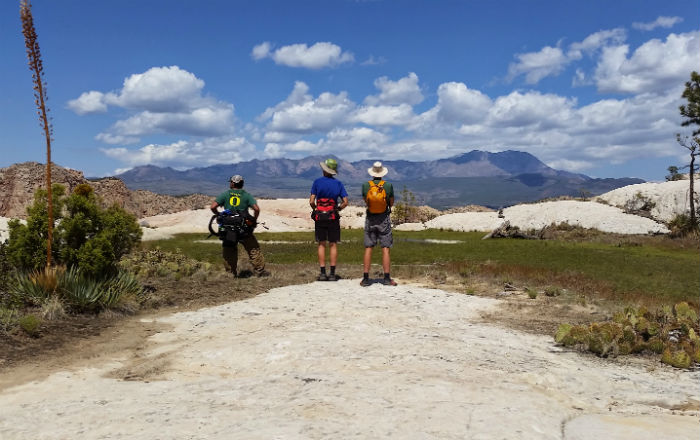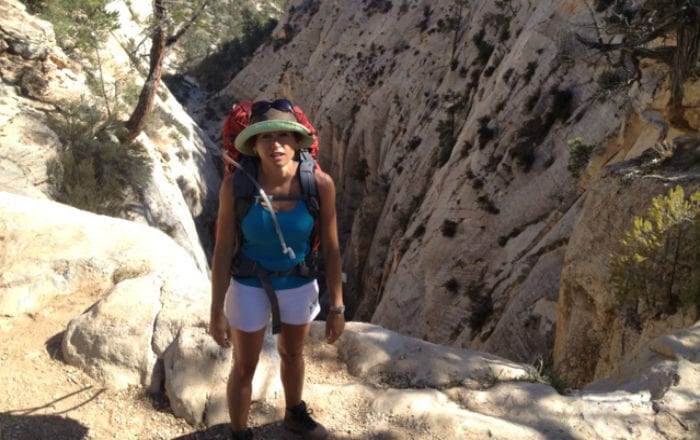
Written by Greta Hyland
In “Fire in America,” Stephen Pyne says that wilderness is a natural as well as a cultural phenomenon and that as an idea and political fact, it is a human artifact. He then goes on to say that wilderness is a relative term, defined in relation to human values, not according to some absolute natural standard.
While I largely agree with what Pyne is saying, I would argue that it is human values that are the artifact, and it is values that are relative. I think that wilderness in the age-old sense of the word does have a natural standard—though maybe not absolute—and that the idea of wilderness culturally speaking has been rather static. The divergence came when values changed. In America, the paradigm shift happened when we collectively decided that wilderness held more than just economic value and that it must be protected.
But my earliest idea of wilderness did not come from an American ideal; it came from the Bible. Wilderness was a real place with geographical and natural characteristics that prophets went to for vision, clarity, prayer, and to be cleansed, tested, and tried. It was the hallowed ground where men communed with God. It was where people found either the strength to defeat temptation or succumbed to it. Nature was the medium that God used to communicate and reveal his power, usually through people. Consider the parting of the Red Sea, the burning bush, walking on water, calming a tempest, a man living in the belly of a fish. I could go on and on. But it wasn’t just for prophets; wilderness was available to anyone who sought sanctuary or purification there. We are even told that Christ himself, the son of God, was tempted and tried in the wilderness.
Those who went in knew something would be required of them—the proverbial pound of flesh you might say. They knew the wilderness would extract payment for entering, and those who entered accepted the cost for what they would get in return, accepting also the risk that the wilderness might take it all. In the Bible, this was largely determined by a person’s faith and obedience to follow God’s commands.
In my mind, wilderness intricately linked physical strength with spiritual strength. I knew at a very young age that wilderness was not a fun place, but it was a necessary place if one wanted to grow spiritually. I learned that you could both choose to go to the wilderness and that you could end up there involuntarily. It was often used as a metaphor for emotional, mental, or psychological struggle. But the implication was the same: it will challenge you, it can break you, and it can make you. Entering wilderness came to signify a soul shaking period of time, and how you got through it would define you.
Something about leaving the comforts of home and civilization for a wild land or seas brought people to their knees. It tested their mental strength, emotional fortitude, and physical endurance. It shook their faith, revealed their fears, and invaded their psychological makeup. And in most of the stories, after the wilderness had infiltrated them at the most primal level, they left something of themselves behind and brought something wild back with them. They came back changed. That is still true today, and though we often call it adventure, whether it is by faith or tenacity—or a combination of both—it still requires something of the person to persevere.
But again, our values and culture have changed and so have definitions. Adventure in the annals of history was typically synonymous with hardship and life or death decisions. While adventures today can still end in tragedy and death, our technological advances in gear, medicine, travel, and communication allow us to attach the word “fun” to it. But still, even today, we instinctively know that there are costs associated with it. And whether we know it or not, we learn something personal about ourselves out there, and at the end of the day, we discover that wilderness affects individuals. Wilderness is personal. It is the one place you can’t go to escape yourself.
Christianity teaches us to be in this world but not of it, but the Bible did not mean the natural, physical world. The natural world was where humanity and spirituality merged. It was where a person could leave worldly things behind and realign; they could find themselves. It was where they could get in touch with mortality and time and be humbled and grounded. Nature was the spiritual leveler. And it still is. Wild lands were not meant to be turned into man-made lands. They served a very real purpose.
So back to Pyne. He was referring to the American idea of wilderness: big chunks of land set aside by the Federal Government and protected by the law. What was unique about America was that as a culture and society, we decided that wilderness—these pieces of rugged, remote, and wild land—needed protection. And while that is unique, it was the idea that we needed to protect it from ourselves that is remarkable. It set into motion a period of almost unimaginable foresight, selflessness, and morality toward something non-human and to generations of the unborn. It was our attempt to save our land from our own “fallen” nature. It was unheard of.
It set a precedent and created what became a national conservation ethic that led to an environmental ethic.
Out of it an American ethos was born, an ethos built on a wild landscape that had given birth to a wild nation. America was a wilderness, and we rose up out of it. In preserving our lands, our continent, for all the various reasons, an incidental one was the preservation of our cultural history written across a living landscape. According to Pyne, the land held both a new world and the oldest of worlds, which both projected a future and restored a past.
It wasn’t an idea that ignited action overnight but rather was an evolving idea that grew and morphed into something rather astounding, so astounding in fact that this idea has always had adversaries. Like the Biblical stories of old, there were forces at play over wilderness—battles, you might say—that are still being fought.
Since the 1930s, there has been a segment of society trying to wrestle our wild lands from us. The narrative has not changed much, but the tactics have. At the height of this movement during the Sagebrush Rebellion, many supporters of it came to the realization that they were shooting themselves in the foot by supporting such a cause and dropped it. How you might ask? Because state land is not necessarily public land. Access would be limited by those who own it and the low prices and access both demanded and protected by the Federal Government would disappear for state or private prices and restrictions.
Take grazing for example. It costs $15 per AMU on average on state land. It costs under two dollars on federal public lands. But this is about more than ranching; it’s about hunting, fishing, hiking, camping, birding, mountain biking, climbing, and kayaking, to say nothing of spiritual fulfillment or reward. In short, it’s about getting out and tasting a bit of our history and becoming a part of an American tradition and heritage in ways that Americans have been able to do for centuries. It is freedom at the simplest level. Freedom to roam. Freedom to enter. Freedom to see. Freedom to experience, to be alone, to escape.
If you don’t know this, and politicians are promising you freedom from government intrusion and regulation, do some research. Everything is not as it seems, no matter how good it sounds. Our state representatives’ greatest tools are public ignorance and emotion. They are using emotional tag lines cloaked in American myth and legend to hoodwink those who don’t know the history or what is at stake—or in store—if they succeed.
It would literally take an act of Congress to give our public lands, our wilderness, to the states, and that is exactly what Ken Ivory and his non-profit, The American Lands Council, is trying to do. If Ivory and others like him can convince enough constituents to back representatives in Congress, they could succeed.
We must ask ourselves what our lands are worth, what access to them is worth, what we get from them is worth, and if we find that it holds value to us, then we need to fight to keep it because those on the other side are fighting for what they want. Doing nothing is still doing something.
How our future unfolds depends on our values, shaped by a consistent but evolving culture. Wilderness is and has been long before we ever were, and it will be long after we are gone. How we interact with it is the question. In America, it holds age-old biblical values that feed the soul, and it holds American values that characterize a nation. Wilderness is more than a legal definition of a piece of land on a map; wilderness is any land not developed by people. It is a state of mind. It is an idea. It is an ethic. And it holds value. It holds our values. And how we handle our lands today reveals what we value as a Nation now.
As Pyne went on to say, “It has often been claimed that America’s natural wonders, especially its great wilderness preserves such as Yellowstone and the Grand Canyon, are to American society what cathedrals, castles, or temples are to other cultures, that Americans look to nature for what other people find in the traditions of a common folk past or in the treasures of a bygone civilization…for Americans, that inheritance is defined by a national creation myth in which its people evolved along a wilderness frontier.”
Whether you are religious or not, Christian or not, religious stories reveal much about human nature: our needs and desires, our strengths and weaknesses, our temptations and sins. And even our wilderness. It also speaks to regrets and consequences. In the Old Testament, there’s a story of two brothers, one of whom sells his birthright for a bowl of soup. It was an act born out of instant gratification that lacked foresight and wisdom. His decision baffles the reader because the reader understands the value of the birthright. Esau paid for that decision. We could learn something from him when it comes to decisions about our own birthright.
Greta Hyland has a Masters degree in Environmental Policy & Management. A Utahnative, Greta is a consummate desert rat and loves exploring and adventuring in the southwest.




